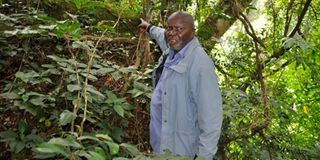Tiriki locals defy virus rules as 3,000 teens set to get ‘cut’

Mr Thomas Ingara at a tree used as one of the circumcision shrines inside Kaimosi forest in 2019. Circumcision is an important rite among the Tiriki.
What you need to know:
- Families in Shiru, Cheptulu, Muhudu and Shamakhokho, commonly referred to as Tiriki East, began performing the ritual on Tuesday with more boys facing the knife yesterday.
Circumcision is an elaborate ceremony among the Tiriki, usually held every five years. The last rite was in 2015.
Members of the Tiriki community have put their elders in a fix after defying an advisory against holding the circumcision rite this year.
The elders had earlier advised against the rite, citing the coronavirus situation in the country.
They had decreed that the ceremony be pushed to next year.
Households have, however, disregarded the elders’ and government advice and lined up at least 3,000 boys for circumcision this week.
Families in Shiru, Cheptulu, Muhudu and Shamakhokho, commonly referred to as Tiriki East, began performing the ritual on Tuesday with more boys facing the knife yesterday.
A group of elders backs the ceremonies.
This has caused divisions in the elders’ council, with Council of Elders chairman Oscar Bulemi, who hails from Tiriki West, dismissing the rite as not genuine.
He added that this is not the right time for the cut since it’s outside the harvest seasons of August and December.
“We never circumcise our boys during hunger,” Mr Bulemi said. “Whatever is happening is destructive to our community and we’re not party to it.”
Live in the forest
Circumcision is an elaborate ceremony among the Tiriki, usually held every five years. The last rite was in 2015.
The month-long ceremonies involve traditional songs, drumbeats and dance.
The boys are taken to live in the forest until they recover. They at times come out of the forest donning traditional attire to take part in song and dance.
Face covered, every initiate carries a decorated stick, a symbol of their transition from childhood to adulthood.
Circumcision in this community signifies cultural growth. The shedding of blood binds the boys to their ancestors, elders say.
Tiriki West locals have heeded the call by the elders to postpone the ritual owing to the pandemic.
Elders supporting the ceremony feared some locals would have their children cut in.
Elders Council secretary Jairus Lipala is one of the people in support of the ongoing ceremonies.
Disobeyed the ban
He said there will be no room for the fete next year because the school calendar will not have long breaks. Mr Lipala comes from Tiriki East
He added that parents pressed the elders to support the idea. He said the initiates would graduate on November 14 and 21.
According to Mr Bulemi, elders will meet in January to make a decision on what to do with people who disobeyed the ban on the rite.
Elders in Bungoma, Trans Nzoia and parts of Kakamega defied the Ministry of Health coronavirus guidelines and oversaw the ceremonies.





